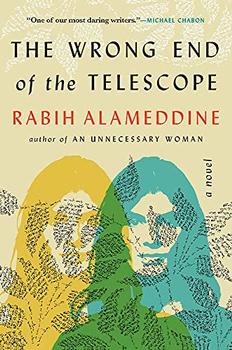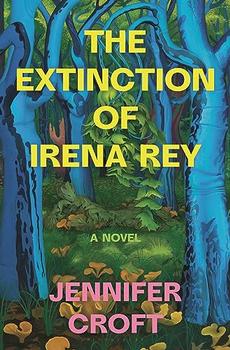Summary | Excerpt | Reviews | Beyond the book | Read-Alikes | Genres & Themes | Author Bio

Rabih Alameddine's The Wrong End of the Telescope follows Mina, a Lebanese American doctor who travels to Lesbos to help Syrian refugees arriving on the Greek island. A transgender woman, Mina lives with her wife Francine in Chicago, estranged from her immediate family due to their refusal to accept her transitioning — with the exception of her brother Mazen, who will soon join her from (relatively) nearby Beirut. In the narration, Mina reveals that she is telling the story of her experiences in Lesbos at the request of a mysterious "you."
"You suggested I write this," she says. "You, the writer, couldn't. ... You insisted I write the refugee story, as well as your story and mine. This thing."
Eventually, Mina begins to hint that the "you" in question may be Alammedine himself, or a character based on him — a Lebanese writer who has, like her, arrived on Lesbos to offer assistance. She alludes to previous writing of his (see Beyond the Book); and Mina's friend Emma, who works for a nonprofit dealing with the ongoing refugee crisis, makes cruel but funny comments about a novel that mirrors Alammedine's real-life book An Unnecessary Woman, declaring it "not a story" and "just stupid."
Mina, Alameddine's double, and other volunteers close to them appear to populate an intermediate space between the privileged college kids who take selfies while engaging in charity tourism and the refugees — including Sammy and Sumaiya, a couple fleeing Daesh (the terrorist group better known in the West as ISIS) to save their 10-year-old daughter Asma from a forced marriage — who play a significant part in the novel. But the book questions how different Mina and the writer really are from those who are more outwardly exploitative of the misfortunes of others. It uncovers no simple answers. Mina pokes fun at her friend for having come to help refugees and then hidden out in his hotel for several days, but also acknowledges his personal traumas, narrating his family's displacement from Lebanon by the Israelis as well as his struggles to adjust to living as an immigrant and a gay man in America. A general theme of displacement emerges between the refugee crisis and the two characters' own separations from their homeland.
The Wrong End of the Telescope is filled with humor that verges on anger, sadness or other strong emotion. Towards the beginning of the novel, Mina recounts that her friend warned her of the story she is writing, "...don't fucking call it A Lebanese Lesbian in Lesbos, just don't." Alameddine may be joking about his own inability to resist this irreverent phrasing, and teasing the reader with the possibility that he has created Mina out of the coincidence of its wordplay. But he also hints here at the necessary reinvention of oneself that may accompany the experience of being a displaced person, or of being a sexual or gender minority. And Alameddine clings to his own invention, however tenuous its basis, as he proceeds to seriously craft the tale of "a Lebanese lesbian in Lesbos"; weaving together Greek mythology, Sumaiya's ongoing struggle with a fatal illness, the developing relationship between Mina and Sumaiya's family, and the backstories of the writer and Mina; leaning on the etymological ties between queerness and the region, on the physical and linguistic proximity of Lebanon and Lesbos; until it all begins to form a brilliant and cohesive whole.
Near the end of the book, Mina asks the writer of his failed attempts at the story he has endeavored to hand off to her, "Did you believe that if you wrote about Syrian refugees the world would look at them differently? … At best, you would have written a novel that was an emotional palliative for some couple in suburbia."
Needless to say, this isn't that novel. The Wrong End of the Telescope attempts the "refugee story" despite Mina's own doubts, but gently declines both performative empathy and cynicism. Concerned — as its title implies — with perspective, it suggests that the grace and kindness people can show themselves and each other is not necessarily facilitated by understanding, and that it may even sometimes be best to resist the impulse to possess knowledge of the other, or of the mystery of life. With this book, Alameddine gives us a funny and sad tale that caters to no particular audience, that no one asked for, and that is all the more generous for it.
![]() This review was originally published in The BookBrowse Review in October 2021, and has been updated for the
September 2022 edition.
Click here to go to this issue.
This review was originally published in The BookBrowse Review in October 2021, and has been updated for the
September 2022 edition.
Click here to go to this issue.

If you liked The Wrong End of the Telescope, try these:

by Jennifer Croft
Published 2025
From the International Booker Prize-winning translator and Women's Prize finalist, an utterly beguiling novel about eight translators and their search for a world-renowned author who goes missing in a primeval Polish forest.

by Hisham Matar
Published 2025
A luminous novel of friendship, family, and the unthinkable realities of exile, from the Booker Prize–nominated and Pulitzer Prize–winning author of The Return
I like a thin book because it will steady a table...
Click Here to find out who said this, as well as discovering other famous literary quotes!
Your guide toexceptional books
BookBrowse seeks out and recommends the best in contemporary fiction and nonfiction—books that not only engage and entertain but also deepen our understanding of ourselves and the world around us.